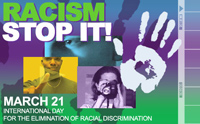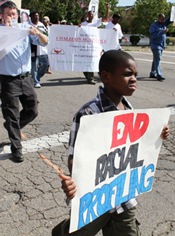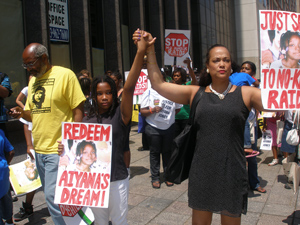Activists unhappy with U.S. inaction on racial disparity
By Saeed Shabazz -Staff Writer- | Last updated: Apr 3, 2011 - 11:54:37 PMWhat's your opinion on this article?

|
The International Day for Racial Discrimination is commemorated annually on March 21 to coincide with the date in 1960 when police opened fire and killed 69 Black South Africans gathered in Sharpeville for a peaceful demonstration against apartheid, the system of racial segregation and White minority rule in the country at the time.

Youth protests police brutality.
|
The administration is reluctant to deal with relatively recent disparities that go back to the 1990s, when the U.S. was enjoying a period of prosperity, Ms. Dike explained to The Final Call. Even in the best of economic times for the United States, there was uneven progress based on race. “And the worst part of this is that the administration has made no clear acknowledgement that there is a problem,” she said.
The Justice Center listed some disparities: Blacks hit by a high rate of unemployment, 25.8 percent, as result of the recession, while Latino unemployment stands at 25.3 percent and unemployment for Whites stands at 9.4 percent. Poverty for Black children stands at 35.7 percent—while the national child poverty rate is 20.7 percent. For every dollar of net worth possessed by White Americans, Blacks possess only seven cents.
“We need an effort that will include more than enforcing civil rights laws that we have,” Ms. Dike added.
Human rights organizations in the U.S. want President Obama to adopt a national plan of action to fully implement America's obligations under the International Convention on the Elimination of all forms of Racial Discrimination, which is also known as CERD.
In 1994, the U.S. ratified the UN-sponsored convention which defines in its Article 1, racial discrimination is “any distinction, exclusion, restriction or preference based on race, color, descent, or national ethnic origin, which has the purpose or effect of nullifying or impairing the recognition or exercise, on an equal footing, of human rights and fundamental freedoms in the political, economic, social, cultural or any other field of public life.” Activists argue that means looking at racial disparity and taking immediate and committed steps to eliminate shortfalls—and not simply responding legally when civil rights violations are charged.

Demonstrators take to streets after killing of young girl during Detroit police raid. Rights activists say the Obama administration has failed to deal with race or acknowledge depth of the problem. They want a national human rights institution to deal with racial inequity.
|
Human rights activists, including Ajamu Baraka of the U.S. Human Rights Network, expressed disappointment with the lack of U.S. action since the review. The Obama administration has not established a national human rights institution to monitor rights compliance, they said.
“The initial response from the U.S. government to the UPR (review) process makes for depressing reading,” Mr. Baraka said, in a statement. “It seems that the Obama administration is simply continuing with the policies of the Bush administration when it comes to human rights, despite pretense of being engaged with the international community on human rights.”
U.S. human rights advocates needs to take a hard look at what consultations and work with the administration actually achieved and go back to the drawing board, Mr. Baraka added.
And, he told The Final Call, the groups should continue to push the U.S. to honor commitments made to eliminate discrimination, racism and its impact.
The Honorable Minister Louis Farrakhan, of the Nation of Islam, wisely counseled the government of America in his 1993 book “A Torchlight for America” that it is the wrong time to deny just pursuits of liberty.
“It's a dangerous time to play with people whose hunger and thirst is for justice and truth,” Min. Farrakhan wrote.
“It is the purpose of the wickedly wise to hide the truth so that people won't see a way to get themselves out of their present circumstances, so those who rule can continue to dominate and subjugate the people to feed their own lusts and greed,” the Muslim leader noted.
Saladin Muhammad, national chairman of Black Workers for Justice, attended the review meeting in Geneva. He found a “condescending” attitude by U.S. officials dealing with racial discrimination “quite disturbing.”
Mr. Muhammad said the condescending attitude was apparent in the opening statement of Harold Hongju Koh, a legal adviser from the U.S. State Department, who presented the administration's answer to the review: “Our society as a whole is transformed for the better through our work to protect and promote the civil and human rights of its least powerful members. That tradition explains why I, the child of Korean immigrants who came to America to search for a better future, sit before you today to represent our country.”
Mr. Koh's next statement, according to participants, seemingly dismissed the importance of the review.
On March 7, a coalition of human rights organizations sent a letter to the UN Committee on the Elimination of racial discrimination. “People of African descent in the United States continue to face intentional, structural, and de facto forms of discrimination which manifest in unequal access to quality education, housing, health services, employment, electoral disenfranchisement and discrimination in the criminal justice system, among many other issues,” the letter said.
A full text of the letter is available on line at: http://goo.gl/AHmQB
Some of the organizations signing onto the letter include the American Civil Liberties Union, Asian American Justice Center, Center for Constitutional Rights, Leadership Conference for Civil and Human Rights, U.S. Human Rights Network and the Lawyers' Committee for Civil Rights Under Law.
“The goal of the letter was to inform the UN committee of efforts by civil rights organizations in the United States urging the government to adopt a coordinated approach to complying with the CERD treaty and by doing so ensure that CERD obligations are integrated into domestic laws addressing racial discrimination,” said Marcia F. Johnson-Blanco, co-director of the Voting Rights Project for the Lawyer's Committee, in an e-mail to The Final Call.
Prior to the Geneva meeting, some activists felt with the U.S. officially responding to questions about racism and discrimination, it was a chance to lead by example, not just rhetoric. That opportunity appears to be squandered.
“I came away from Geneva feeling that unless there are extended struggles on the ground, also developing a strong Black Manifesto, what we did on March 18 will be looked at as just a complaint. And that means all of our efforts so far won't be impactful,” Mr. Muhammad said.
Ms. Dike's organization is drafting a petition asking the administration to come up with a timeline for creation of a national plan to end racial discrimination in America. It may help highlight the problem, but doesn't appear likely to push America toward finding solutions.
INSIDE STORIES AND REVIEWS
-
-
About Harriett ... and the Negro Hollywood Road Show
By Rabiah Muhammad, Guest Columnist » Full Story -
Skepticism greets Jay-Z, NFL talk of inspiring change
By Bryan 18X Crawford and Richard B. Muhammad The Final Call Newspaper @TheFinalCall » Full Story -
The painful problem of Black girls and suicide
By Charlene Muhammad -National Correspondent- » Full Story -
Exploitation of Innocence - Report: Perceptions, policies hurting Black girls
By Charlene Muhammad -National Correspondent- » Full Story -
Big Ballin: Big ideas fuel a father’s Big Baller Brand and brash business sense
By Bryan Crawford -Contributing Writer- » Full Story






 Click Here Stay Connected!
Click Here Stay Connected!








